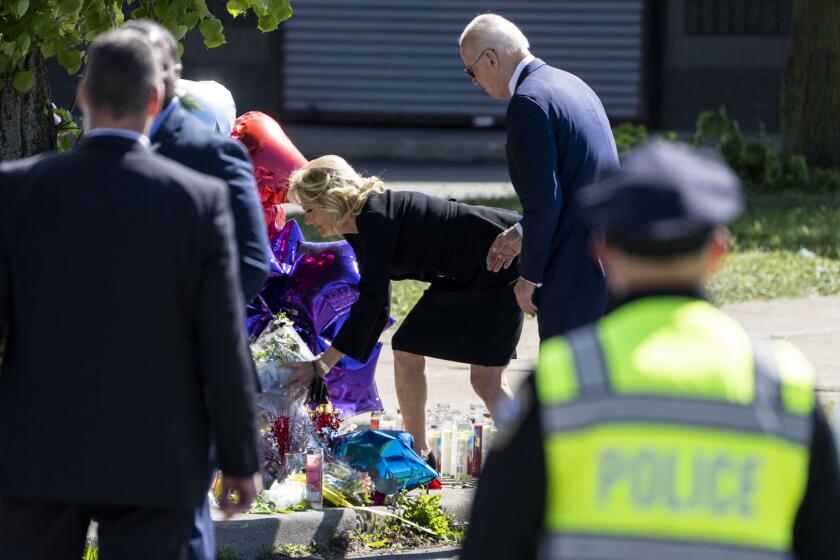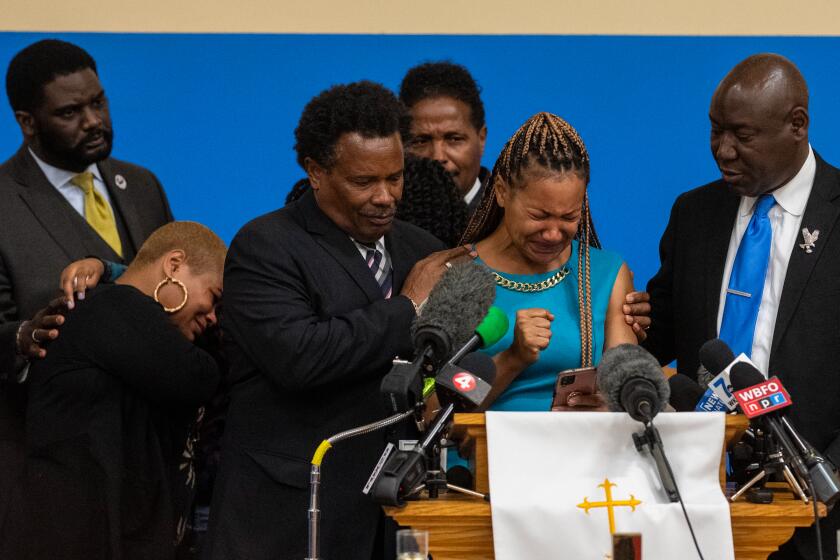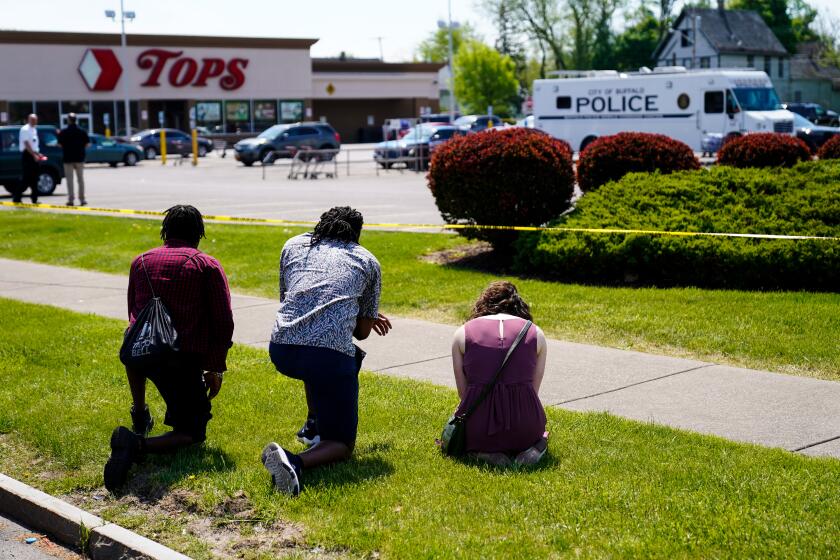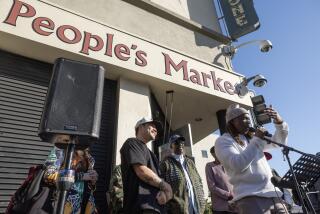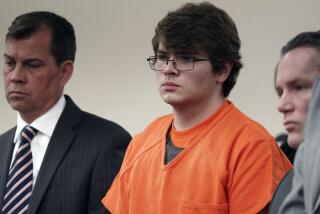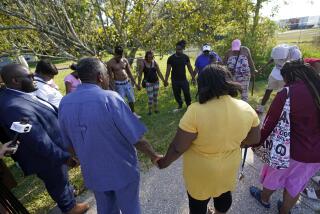An old refrigerator becomes a vital gathering spot after mass shooting in Buffalo
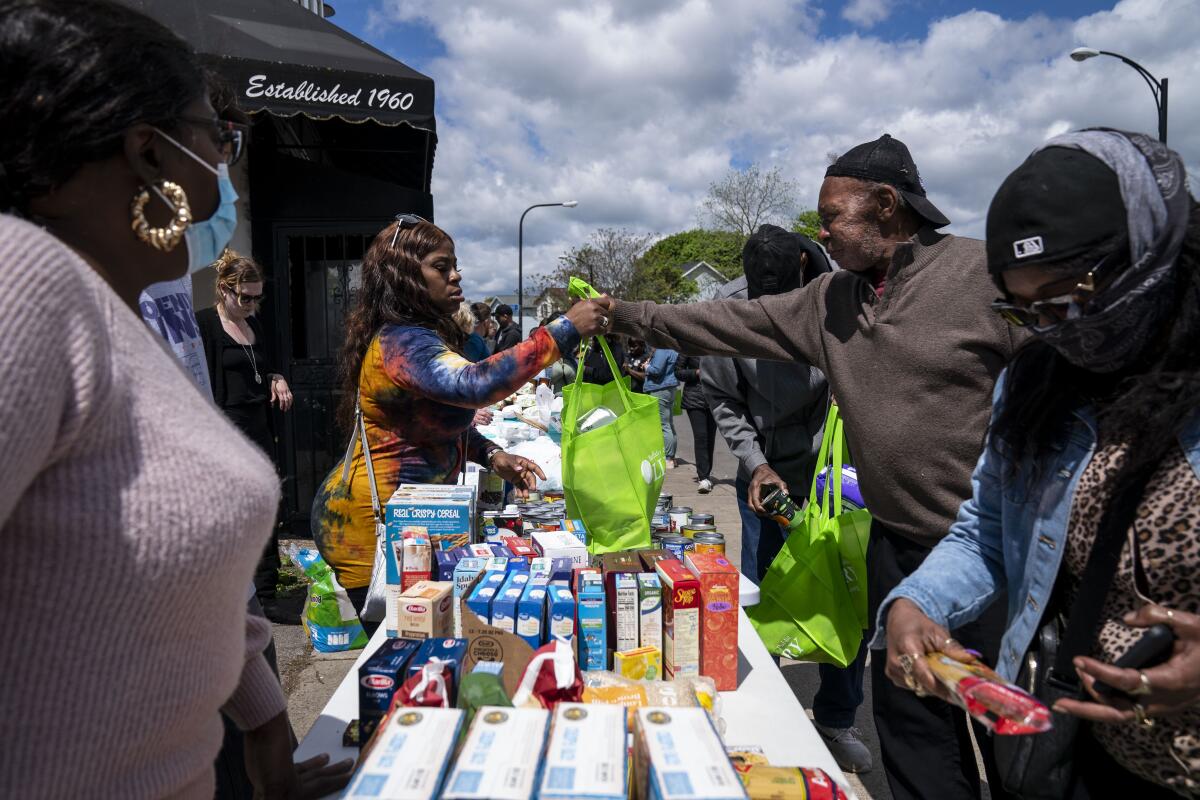
In the fall of 2020, somebody placed an old refrigerator at Jefferson Avenue and Welker Street in Buffalo, N.Y., and plugged it into an outlet in an adjacent building.
It became a small source of pandemic relief for families in one of Buffalo’s poorest neighborhoods. Volunteers did their best to keep it stocked with donated groceries. Anybody who needed food was free to raid the fridge, or the cupboard set up beside it.
Now, in the wake of Saturday’s shooting massacre in Buffalo, the fridge has never been more important to the community.
It sits just half a mile or so from the Tops Friendly Markets store where an 18-year-old gunman motivated by anti-Black hatred killed 10 people and wounded three.
Amid their grief, the residents of Masten Park are also faced with a very practical concern now that the store is closed: It was the only place for blocks to buy groceries.
“Do you have soap?” a woman — one of dozens of people still waiting in line as the sun began to set Tuesday — shouted to the volunteers who had been showing up all day at the fridge to hand out food. “Do you have dog food?”
President Biden go to Buffalo to meet the families of victims killed in what police described as a racially motivated shooting. Ten people died in the carnage.
The fridge was a sight to behold. Long ago it had been painted with a mural of black, brown and white hands touching a heart. At the top, in red and orange paint, it said, “Free food.”
“It’s a just cause,” said Gloria Smith, 61, who had come with her sister to hand out baby food, boxes of cereal, pasta and other items. “We’re all human beings, and we should try to unite and do good.”
The neighborhood is predominantly Black, but the food giveaway was a decidedly multiracial effort — with an unmistakable message that the hate that motivated the killer has no place here.
Betty Jackson, 78, who was visiting the fridge for the first time, said she was happy to see the volunteers — Black, Latino and white — working together.
“If they can do this together,” Jackson said. “They can do anything. It’s beautiful.”
She and a friend walked away with two grocery bags each.
In the parking lot next door, 71-year-old Eddie Colbert, loaded down with four bags of groceries, was waiting for a friend to pick him up.
Colbert, who a day earlier reconnected with an old friend at the fridge, said it’s more important than ever now for people to embrace kindness.
“I’ve been noticing things like this, seeing people hugging each other, praying for one another,” he said. “The only way to address hate is doing more of that.”
Residents cite how the neighborhood was left behind as other parts of the city thrived.
Sara Cruz, 20, arrived with beverages, dog food and baby formula. Volunteers helped her carry some of the items to the distribution area.
“It’s beautiful to see the different races because this was unfortunately a racially motivated attack,” she said. “There’s beauty in unity.”
New requests — sausages, eggs, milk — came as quickly as the volunteers could open and close the fridge.
One by one people helped themselves to the peanut butter, cereal and canned vegetables stacked on two folding tables, filling the green shopping bags that the volunteers provided.
Jermaine Saffold, 37, asked for toothpaste, feminine products for his sister and cheese. His wishes were fulfilled.
“The bare necessities you would get at the market, you get it here,” he said. “They have fresh produce here too.”
In line beside him, Willitta Jones, 43, said the community fridge makes her feel as though there’s still a god.
“Only the power of God moves people to step in and help,” she said.
A ‘lone wolf’ killer? That might be a comforting thought, if only it were true.
Talk eventually turned to the shooting and how residents are afraid to return to supermarkets. Saffold said there was comfort collecting groceries without having to go inside a building.
Until the late 1990s, residents said, there were no grocery stores in the neighborhood. When Tops finally opened — after a campaign to pressure elected officials to help — it was smaller than most stores in the chain.
It’s too early for anybody to say when people will be able to shop at Tops again.
In Boulder, Colo., where a lone gunman killed 10 people at a grocery store March 22, 2021, it took nearly a year for it to reopen — with a redesign that had been shaped by input from the community.
It was about 9:30 p.m. when the volunteers in Buffalo began to fold up the tables and carry leftover food items to their cars. The fridge remained stocked with cheese sticks, water jugs, yogurt and carrots. It’s open to anybody at any time.
More to Read
Sign up for Essential California
The most important California stories and recommendations in your inbox every morning.
You may occasionally receive promotional content from the Los Angeles Times.
